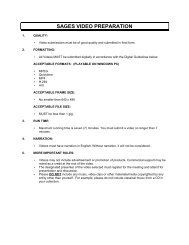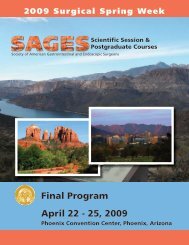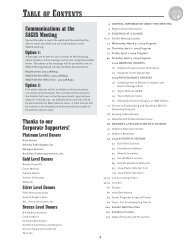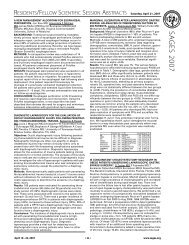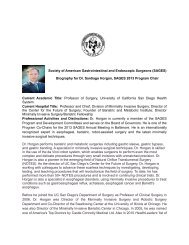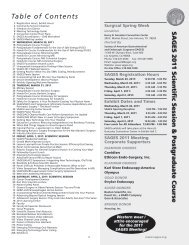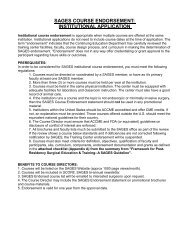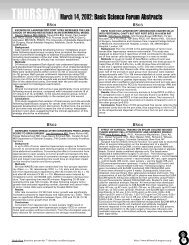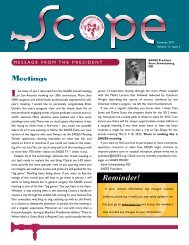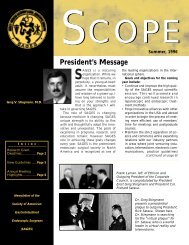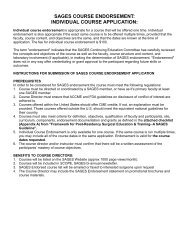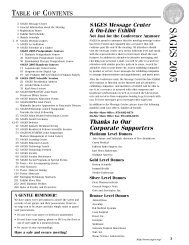2005 SAGES Abstracts
2005 SAGES Abstracts
2005 SAGES Abstracts
Create successful ePaper yourself
Turn your PDF publications into a flip-book with our unique Google optimized e-Paper software.
POSTER ABSTRACTS<br />
<strong>SAGES</strong> <strong>2005</strong><br />
BSP used or perceptions of the relative safety of LS.<br />
Conclusion: Occupational exposures among surgical residents<br />
are less common in LS as compared with open surgery.<br />
Operating laparoscopically did not influence the BSP used by<br />
surgical trainees during surgery, even though the majority of<br />
surgical residents feel LS is safer.<br />
P163–Education/Outcomes<br />
EARLY VERSUS DELAYED INTERVAL LAPAROSCOPIC CHOLE-<br />
CYSTECTOMY FOR ACUTE CHOLECYSTITIS: A META-ANALY-<br />
SIS, Hung Lau MD, University of Hong Kong Medical Center,<br />
Tung Wah Hospital, Sheung Wan, Hong Kong<br />
Background: Early laparoscopic cholecystectomy has been<br />
advocated for the management of acute cholecystitis but little<br />
data exists to support the superiority of this approach over<br />
delayed interval operation. The present systematic review was<br />
undertaken to compare the outcomes and efficacy of early and<br />
delayed interval laparoscopic cholecystectomy for acute cholecystitis<br />
in an evidence-based approach using meta-analytical<br />
techniques.<br />
Methods: A search of electronic databases, including MEDLINE<br />
and EMBASE, was conducted to identify relevant articles published<br />
between January 1988 and June 2004. Only randomized<br />
or quasi-randomized prospective clinical trials in English language<br />
comparing the outcomes of early and delayed interval<br />
laparoscopic cholecystectomy for acute cholecystitis were<br />
recruited. All papers were critically appraised with respect to<br />
their methodology and outcome. Both qualitative and quantitative<br />
statistical analyses were carried out. The effect size of<br />
outcome parameters was estimated by odds ratio and weight<br />
mean difference where feasible and appropriate.<br />
Results: A total of 4 clinical trials comprising 504 patients met<br />
the inclusion criteria. Failure of conservative treatment requiring<br />
emergency cholecystectomy occurred in 42 patients in the<br />
delayed group. Meta-analyses demonstrated a significant<br />
shortening in the total length of hospital stay in the early<br />
group (weighted mean difference = - 1.12, 95% CI = -1.42 to<br />
¡V0.99, P < 0.001). Pooled estimates of operative time, conversion<br />
rate, overall complication rate, bile leakage and intraabdominal<br />
collection showed no significant differences between<br />
two approaches.<br />
Conclusions: The safety and efficacy of early and delayed<br />
interval laparoscopic cholecystectomy for acute cholecystitis<br />
were comparable. Evidence suggested that early laparoscopic<br />
cholecystectomy conferred a significant shortening in the total<br />
length of hospital stay. Early cholecystectomy is therefore a<br />
cost-effective approach and reduces the risk of recurrent acute<br />
cholecystitis or development of other biliary complications.<br />
P164–Education/Outcomes<br />
TELESURGERY ENHANCES EDUCATION OF MEDICAL STU-<br />
DENTS, Thomas P McIntyre MD, Leonardo Villegas<br />
MD,Jennifer Doyle BA,Daniel B Jones, Beth Israel Deaconess<br />
Medical Center, Harvard University<br />
INTRODUCTION: Telesurgery (TS) may improve the learning<br />
environment for third year medical students. Our aim was to<br />
evaluate the TS environment vs. the traditional Operating<br />
Room (OR) in two aspects: student satisfaction and studentfaculty<br />
interaction. METHODS: Typical OR learning during the<br />
third year medical student surgery clerkship was supplemented<br />
with two TS sessions to which all students (n=11) were<br />
invited. Faculty-student interaction was evaluated by an independent<br />
observer in both settings. Surgeons and students<br />
were blinded to the study. Students also completed a questionnaire<br />
evaluating each setting. (scale: 1=not at all; 5=completely).<br />
Analysis was performed using a T-Test. RESULTS: The<br />
average time allotted to sessions were; TS=77.5 min; OR=76<br />
min. A total of 12 observations were conducted (TS=2; OR=10),<br />
and 29 evaluations were returned (TS=19; OR=10).<br />
Observations revealed that nearly 4 times as many teaching<br />
points were made in TS sessions: students asked 5 times more<br />
questions; and faculty asked 3 times more questions of students.<br />
In addition teaching points made in TS sessions were<br />
broader than anatomy and surgical technique. [See Table]<br />
Student evaluations of the TS sessions were more positive:<br />
they felt freer to ask questions, reported leaving TS sessions<br />
168 http://www.sages.org/<br />
with fewer unanswered questions and more felt TS sessions<br />
were a good use of their time.<br />
CONCLUSIONS: This study suggests that TS sessions provide<br />
a positive learning environment for third year students,<br />
enabling greater student-faculty interaction. TS sessions allow<br />
the scope of clerkship teaching to expand beyond anatomy<br />
and surgical technique.<br />
P165–Education/Outcomes<br />
VIRTUAL REALITY TESTING ON THE EFFECTS OF SLEEP<br />
DEPRIVATION, Benjamin E Schneider MD, Louis C Rivera BS,<br />
Leonardo Villegas MD,Daniel B Jones MD, Beth Israel<br />
Deaconess Hospital, Harvard Medical School<br />
Background: Sleep deprivation has been shown to increase<br />
technical errors in a virtual reality simulated environment<br />
among surgical residents averaging 2 hours of sleep on call.<br />
Recent adoption of resident work hour restrictions may obviate<br />
the impact of sleep deprivation.<br />
Aim: The purpose of this study was to objectively mesure the<br />
performance of residents when rested and when sleep<br />
deprived.<br />
Methods: Volunteer surgical residents (N=18) were enrolled<br />
prospectively. Residents underwent pre-test instruction, randomization,<br />
and served as their own controls. Questionnaires<br />
assessed sleep, caffeine intake, and subjective measure of<br />
?tiredness.? Testing was directly observed, although actual<br />
assessment was computer-generated using the Minimally<br />
Invasive Surgery Trainer, Virtual Reality (MIST-VR) with a<br />
series of six tasks designed to simulate simple laparoscopic<br />
procedures. Outcomes included speed, error, economy of<br />
motion, and economy of diathermy.<br />
Results: Rested residents reported an average of 6.45 hours<br />
(range 1-13) since last period of sleep compared to an average<br />
of 18.76 hours (range 5.8-33.5) for sleep-deprived residents.<br />
Rested residents reported the length of their last sleep period<br />
to be an average of 5.89 hours (range 4.5-8) while sleepdeprived<br />
residents reported their last sleep as an average of<br />
4.83 hours (range 1.75-7).<br />
Conclusion: In the era of shortened workweek, while residents<br />
report fatigue, resident performance in a simulated learning<br />
environment does not seem to be adversely affected due to<br />
sleep deprivation.<br />
P166–Education/Outcomes<br />
THE IMPACT OF HAPTIC EXPECTATIONS ON INITIAL LAPSIM®<br />
PERFORMANCE: PRIOR LAPAROSCOPIC EXPERIENCE DOES<br />
NOT PREDICT PERFORMANCE, Charles Y Ro MD, Joseph J<br />
DeRose MD,Robert C Ashton MD,Tony Jebara PhD,Avinash<br />
Burra MS,Seung H Shin MD,Haroon L Chughtai MD,George J<br />
Todd MD,James J McGinty MD, St. Luke’s-Roosevelt Hospital<br />
Center, Columbia University<br />
Experts and novices may have different expectations when<br />
confronted with a novel simulated environment. The LapSim®<br />
is a computer-based virtual reality laparoscopic trainer. We<br />
sought to analyze the performance of experienced basic<br />
laparoscopists and novices during their first exposure to the<br />
LapSim® Basic Skill set and Dissection module.<br />
Experienced basic laparoscopists (n=16) were defined as<br />
attending surgeons and chief residents who performed > 30<br />
laparoscopic cholecystectomies. Novices (n=13) were surgical<br />
residents with minimal laparoscopic experience. None of the



